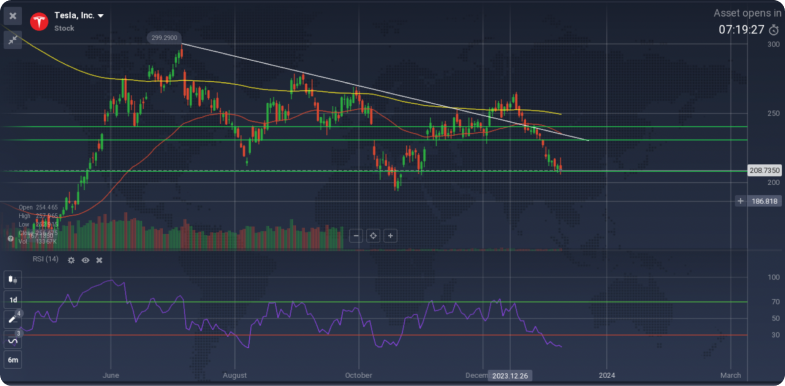Nuances of Tesla CFD Trading


Tesla (TSLA) stands as a pioneering American electric vehicle manufacturer, with a towering market capitalization surpassing $1 trillion. This is a strategic investment reflecting a commitment to long-term economic shifts and an issuer of stocks marked by pronounced volatility. Tesla’s shares are vigilantly tracked by myriad investors, indicating a keen market interest and reflecting the company’s journey since its IPO.
Tesla Motors’ business model exemplifies the Direct-to-Consumer (D2C) philosophy, underscoring a Business-to-Consumer (B2C) approach as it facilitates direct sales, mirroring the ambition seen in its initial public offering. This strategy bypasses intermediaries such as dealerships, offering a bespoke network of charging stations — a testament to Tesla’s innovative retail strategy and clean energy advocacy.
The essence of Tesla’s character lies in its division into three fundamental business models: it’s an automaker renowned for its Model S and Model 3, an equipment supplier championing solar panels and clean energy generation, and a technology firm at the forefront of the nasdaq stock exchange, revolutionizing the sector with cutting-edge autopilot features and sustainable energy solutions.
Owned by the visionary billionaire Elon Musk, Tesla was originally conceived by Martin Eberhard and Marc Tarpenning in July 2003. Yet, it is Musk’s dynamic leadership as CEO and chairman of the board since 2008 that has catapulted Tesla to its status as a trailblazer in the electric car manufacturing domain, embodying the acceleration of the world’s transition to sustainable energy.
Tesla is recognized not solely as an automaker but as a dynamic technology company, deeply invested in the realms of artificial intelligence, robotics, software, and advanced battery technology. This reflects the company’s multifaceted business strategy and its drive to be at the forefront of innovation.
Elon Musk suggests that AI has the transformative potential to elevate Tesla to the highest echelons of global corporate valuation, indicating significant growth potential through the development of artificial intelligence.
The FSD program was a focal point in Tesla’s third-quarter report in 2023, marking a critical step in the evolution of automotive autonomy, potentially leading to significant technological advances for the company.
The Dojo supercomputer, developed by Tesla for the training of AI and FSD, could open new market avenues beyond the automotive industry and strengthen Tesla’s data processing and computational capabilities.
The energy storage business of Tesla has seen substantial growth, becoming its most profitable division, with the quarterly earnings report showing profits of over half a billion dollars.
Tesla’s Supercharging network, the most extensive of its kind globally, remains a profitable enterprise. With other major automakers planning to integrate some of Tesla’s charging stations, this sector is anticipated to provide an additional source of revenue for the company.

The 12-month outlook for Tesla Inc (TSLA) stock shows a bullish trend, with the consensus target price from market analysts averaging $512.76 per share. This represents a substantial +145.57% upside from the present trading price of $208.80. Optimistic projections suggest a ceiling target price of $724.81, while the more conservative estimates sit at $300.71.
Technical indicators paint a bearish sentiment at the moment, yet there’s potential for TSLA to surge to $1,244.38 by 2025, as per extended trend trading analysis. Currently, it might not be the most advantageous moment for initiating new Tesla stock positions, given the volatility and the inherent risk of trading on a bearish stock market, which could lead to capital depreciation.

Tesla shares trade on the NASDAQ stock exchange, following the standard trading session schedule (Eastern Standard Time, EST):
Pre-market session from 4:00 AM to 9:30 AM allows for early positioning in the stock based on overnight news or events.
Regular market hours from 9:30 AM to 4:00 PM are the main session when the stock price can be most active, reflecting the bulk of the day’s trading.
After-hours trading from 4:00 PM to 8:00 PM can provide insights into the stock’s direction, with traders reacting to earnings reports and other significant announcements.
Traders can engage in position trading during these hours, using technical analysis and market sentiment to make informed decisions. The extended hours offer the opportunity to manage positions in response to global events that occur outside the regular NASDAQ trading hours. As with any trading, it’s vital to consider the volatility and potentially lower liquidity during pre-market and after-hours sessions.
There are two main approaches to participating in the stock market. Firstly, one can start trading by purchasing company shares listed on exchanges. For instance, Tesla shares can be acquired on the NASDAQ exchange, granting the investor actual ownership of the company’s stock. This is often seen as a long-term investment, as the investor typically waits for the share price to appreciate over time.
Alternatively, trading a Contract for Difference (CFD) on Tesla allows speculation on the price movement of the underlying asset without actual ownership. A CFD is a financial contract, usually between a broker and an investor, where one party agrees to pay the other the difference in the value of the security between the opening and closing of the trade. You can hold a long position (anticipating that Tesla’s share price will increase) or a short position (expecting TSLA’s share price to decline), which is considered a short-term investment or trade since CFDs are commonly used over shorter periods.
The primary distinction between trading a long position with CFDs and buying the security outright is the use of leverage. CFDs are traded on margin, meaning the trader can open larger positions with their initial capital in Tesla stock trading, amplifying both potential gains and losses.
Tesla’s dynamic presence in the automotive and technological sectors, combined with its foray into AI and clean energy, underscores its potential as a lucrative investment. The company’s robust performance, despite bearish market sentiments, reflects its resilience and innovation. For those looking to navigate Tesla’s investment landscape with enhanced tools and insights, platforms like SabioTrade offer a strategic edge in deciphering market trends and making informed trading decisions. Whether it’s direct stock purchases for the long haul or short-term CFD trading, Tesla remains a compelling entity in the global market.